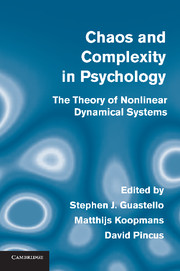Book contents
- Frontmatter
- Contents
- Contributors
- Preface
- 1 Introduction to Nonlinear Dynamics and Complexity
- 2 Collective Intelligence: Observations and Models
- 3 Neurodynamics and Electrocortical Activity
- 4 Psychophysics
- 5 Temporal and Spatial Patterns in Perceptual Behavior: Implications for Dynamical Structure
- 6 Embodied and Embedded: The Dynamics of Extracting Perceptual Visual Invariants
- 7 Origins of Order in Cognitive Activity
- 8 Nonlinear Complex Dynamical Systems in Developmental Psychology
- 9 Developmental Psychopathology: Maladaptive and Adaptive Attractors in Children's Close Relationships
- 10 Psychopathology
- 11 Coherence, Complexity, and Information Flow: Self-Organizing Processes in Psychotherapy
- 12 The Dynamics of Human Experience: Fundamentals of Dynamical Social Psychology
- 13 Group Dynamics: Adaptation, Coordination, and the Emergence of Leaders
- 14 Organizational Psychology
- 15 Complexity, Evolution, and Organizational Behavior
- 16 Agent-Based Modeling Within a Dynamic Network
- 17 Epilogue: Psychology at the Edge of Chaos
- Index
9 - Developmental Psychopathology: Maladaptive and Adaptive Attractors in Children's Close Relationships
Published online by Cambridge University Press: 18 December 2013
- Frontmatter
- Contents
- Contributors
- Preface
- 1 Introduction to Nonlinear Dynamics and Complexity
- 2 Collective Intelligence: Observations and Models
- 3 Neurodynamics and Electrocortical Activity
- 4 Psychophysics
- 5 Temporal and Spatial Patterns in Perceptual Behavior: Implications for Dynamical Structure
- 6 Embodied and Embedded: The Dynamics of Extracting Perceptual Visual Invariants
- 7 Origins of Order in Cognitive Activity
- 8 Nonlinear Complex Dynamical Systems in Developmental Psychology
- 9 Developmental Psychopathology: Maladaptive and Adaptive Attractors in Children's Close Relationships
- 10 Psychopathology
- 11 Coherence, Complexity, and Information Flow: Self-Organizing Processes in Psychotherapy
- 12 The Dynamics of Human Experience: Fundamentals of Dynamical Social Psychology
- 13 Group Dynamics: Adaptation, Coordination, and the Emergence of Leaders
- 14 Organizational Psychology
- 15 Complexity, Evolution, and Organizational Behavior
- 16 Agent-Based Modeling Within a Dynamic Network
- 17 Epilogue: Psychology at the Edge of Chaos
- Index
Summary
Introduction
Routine, day-to-day interactions form the fabric of our interpersonal experience. A mother and her toddler, for example, might have a number of difficult moments in any given day as they jointly navigate the child's newly developing autonomy (e.g., the child wants to play with a forbidden toy). On the other hand, the majority of the day will typically be spent speaking about more neutral topics, such as eating, cleaning up, and getting dressed. Historically, clinical researchers have focused on more atypical, maladaptive interactions between children and their parents or peers, with the goal of reducing these aversive interactions. These maladaptive interactions are important. For example, negative interpersonal interchanges, in moderation, may allow for reflection and insight, offering important opportunities for adaptive change in relationships (Dunn & Brown, 1994; Lunkenheimer, Shields, & Cortina, 2007). However, they are also rare: Even with the most problematic children, observational researchers code only about 5% to 10% of family and peer interactions as aversive (Dishion, Duncan, Eddy, & Fagot, 1994). In contrast, adaptive neutral or positive interactions are not only more common, but we are more likely to observe them in the home and laboratory contexts. Further, an important goal of preventive intervention programs is to promote and build on existing adaptive interaction patterns in close personal relationships. Thus both adaptive and maladaptive interactions in close relationships should be of interest to clinical and developmental psychopathology researchers.
- Type
- Chapter
- Information
- Chaos and Complexity in PsychologyThe Theory of Nonlinear Dynamical Systems, pp. 282 - 306Publisher: Cambridge University PressPrint publication year: 2008
- 1
- Cited by



